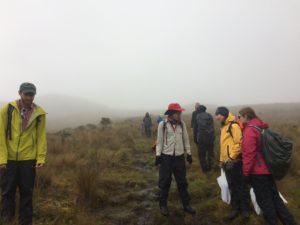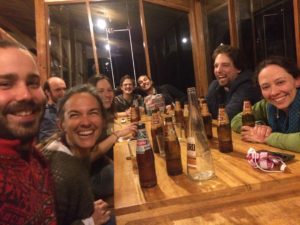
My goals for the course were learn about functional traits, be able to work and discuss different topics with people from different backgrounds and non-Spanish speakers and experience different ways of working. I totally reached my goals!! Well, I still need to improve my English but I consider that I did it better than I had expected. I took the course because I had in mind some research questions related with functional traits but to be honest my ideas were not so clear. After the course I came home with lots of ideas so, now I need some time to work on them and read more. All the people from the course was amazing! I really enjoyed to meet people from different countries. The cultural divesity was priceless! I learned so much about many cultural facts, about different topics (when I talked with the other participans about their actual, past and future proyects) and also I learned many tips about how to be a better/more productive researcher (i.e. how to improve my coding, new tools, pros and cons of different experiments, how to optimize time, etc.).
What did I learn about myself? I learned that I really like to work in the field, even if I am totally exahusted. That sometimes I am too hard on myself. That I am not so good with taxonomy. I want to improve my coding skills. I need to do more cardio. Work in cold and wet weather is not so bad. I really like to work in grasslands (semiarid or wet). I like to memorize new species and measure many plants, I feel powerful (that´s so nerd, don´t tell anyone :D).
About the interviews. In my opinion the survey was very long. I decided to read all the questions to the people because otherwise they got bored at the middle of the survey. The translation of the questions was not so great. People do not always understand what was the point of the questions and they felt them very repetitive. We also noticed that sometimes they wanted to give us the right answer not what they truly think. To my surprise people were not as approachable as I have thought (or maybe not as approachable as in Mexico), sometimes it was difficult to get the information of the open questions. Interviewing people in Paucartambo was more difficult than in Cusco because people barely speak Spanish, they speak Qechua. Older people were the most cooperative ones.
Public opinions about climate change. In my opinion the perceptions of climate change in Peru and Mexico are pretty similar. We could get some interesting data with the surveys. Most of the peruvians are aware of what climate change is and that human activities have contributed and are contributing to promote it. I do not think that it would be a controversial topic for them, in fact I believe that they link human population growth with climate change and that they are open to hear more about the topic and do something about it. Also, most of the people were very concern about the use of disposable items and, as a consequence, about the amount of rubbish they produce. They have perceived some weather changes. They told us that hot and cold seasons are hotter and colder than before and that they are worried about how these changes could affect their health. Additionally, they have noticed that the seasons have changed and that those changes have had or cold potentially have some effects in the food availability, for better or for worse.
